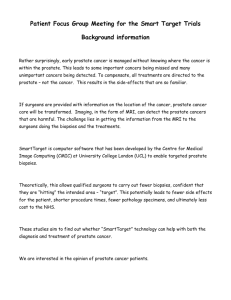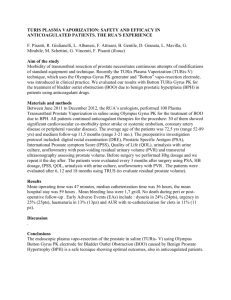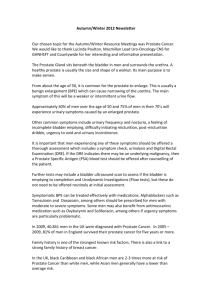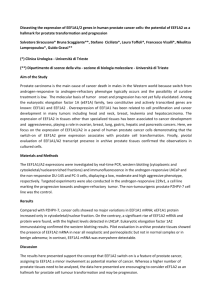PG12-49 Attard Lay summary Principal Investigator: Dr Gerhardt
advertisement
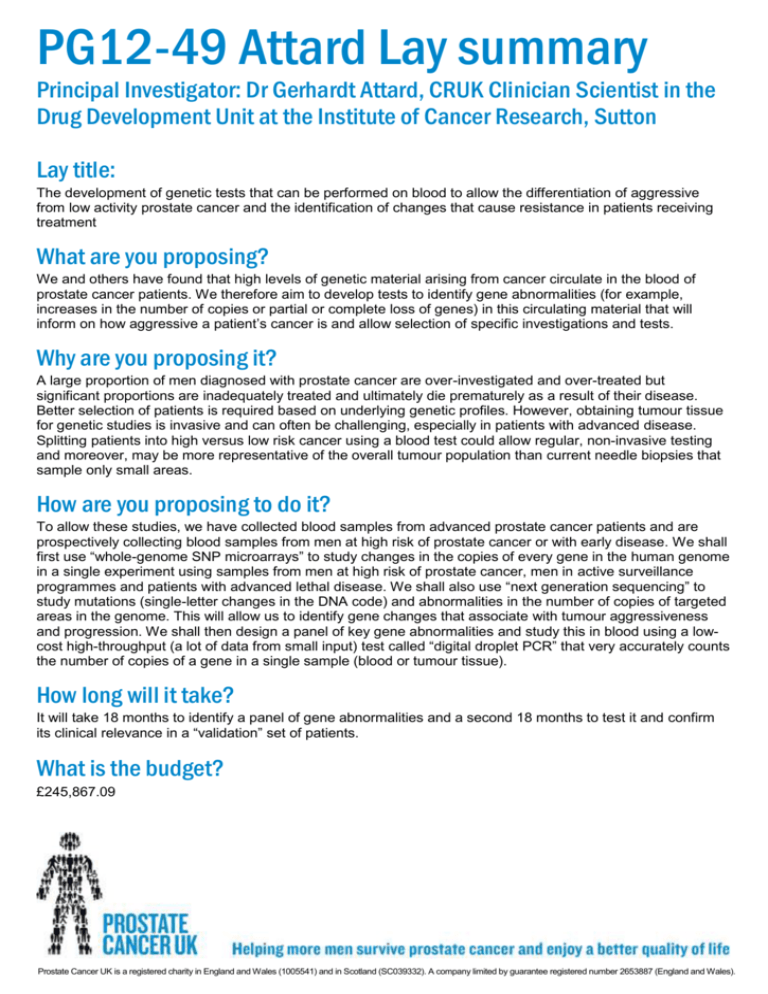
PG12-49 Attard Lay summary Principal Investigator: Dr Gerhardt Attard, CRUK Clinician Scientist in the Drug Development Unit at the Institute of Cancer Research, Sutton Lay title: The development of genetic tests that can be performed on blood to allow the differentiation of aggressive from low activity prostate cancer and the identification of changes that cause resistance in patients receiving treatment What are you proposing? We and others have found that high levels of genetic material arising from cancer circulate in the blood of prostate cancer patients. We therefore aim to develop tests to identify gene abnormalities (for example, increases in the number of copies or partial or complete loss of genes) in this circulating material that will inform on how aggressive a patient’s cancer is and allow selection of specific investigations and tests. Why are you proposing it? A large proportion of men diagnosed with prostate cancer are over-investigated and over-treated but significant proportions are inadequately treated and ultimately die prematurely as a result of their disease. Better selection of patients is required based on underlying genetic profiles. However, obtaining tumour tissue for genetic studies is invasive and can often be challenging, especially in patients with advanced disease. Splitting patients into high versus low risk cancer using a blood test could allow regular, non-invasive testing and moreover, may be more representative of the overall tumour population than current needle biopsies that sample only small areas. How are you proposing to do it? To allow these studies, we have collected blood samples from advanced prostate cancer patients and are prospectively collecting blood samples from men at high risk of prostate cancer or with early disease. We shall first use “whole-genome SNP microarrays” to study changes in the copies of every gene in the human genome in a single experiment using samples from men at high risk of prostate cancer, men in active surveillance programmes and patients with advanced lethal disease. We shall also use “next generation sequencing” to study mutations (single-letter changes in the DNA code) and abnormalities in the number of copies of targeted areas in the genome. This will allow us to identify gene changes that associate with tumour aggressiveness and progression. We shall then design a panel of key gene abnormalities and study this in blood using a lowcost high-throughput (a lot of data from small input) test called “digital droplet PCR” that very accurately counts the number of copies of a gene in a single sample (blood or tumour tissue). How long will it take? It will take 18 months to identify a panel of gene abnormalities and a second 18 months to test it and confirm its clinical relevance in a “validation” set of patients. What is the budget? £245,867.09 Prostate Cancer UK is a registered charity in England and Wales (1005541) and in Scotland (SC039332). A company limited by guarantee registered number 2653887 (England and Wales). What are the expected outcomes? The expected outcomes are the development of a blood test that identifies 1. men advised to undergo a prostate biopsy who have clinically significant prostate cancer from those who do not - this could allow low-risk men with no clinically significant prostate cancer to avoid a prostate biopsy in the future; 2. Men with aggressive prostate cancer from those with low activity disease – thus allowing improved separation of investigations and treatment; 3. gene abnormalities in our advanced prostate cancer cohort that associate with resistance to hormone treatments, including abiraterone – key changes will then be selected and evaluated further to identify new treatment approaches for men with advanced prostate cancer. How could it make a difference to the lives of men affected by prostate cancer? This project aims to: 1. allow men undergoing investigation for prostate cancer to be better informed of their risk of having aggressive disease prior to undergoing a prostate biopsy, 2. better stratify men with early disease into those who have low activity versus aggressive cancer and therefore minimise over-treatment whilst adequately treating men with aggressive disease, 3. identify new therapeutic strategies for patients with advanced prostate cancer who currently have few treatment options. Please write a summary of the project in one sentence only. This study aims to analyse cancer-associated genetic material in blood to identify gene abnormalities associated with aggressive prostate cancer that will allow better selection of men with aggressive versus low activity disease for further investigative studies or treatments and will identify new treatment targets for men with abiraterone-resistant advanced disease.

